- Home
- Upton Sinclair
World's End (The Lanny Budd Novels) Page 14
World's End (The Lanny Budd Novels) Read online
Page 14
“Yes,” said Lanny, “I’ve seen them. Mrs. Chattersworth, who lives up on the heights above Cannes, has some in her gardens, and they do very well.”
To this the other replied: “I suppose they’ll live here if they have to, but they won’t like it.”
In short, the old gentleman was homesick. He said that back in Reubens were fellows who had grown up with him, and would now be pitching horseshoes on the south side of a big red barn where the snow melted early. Lanny had never heard about pitching horseshoes and asked what it was. “I know where the peasants have their horses shod,” said he. “I’ll take you there and maybe we can buy some shoes.”
So that’s what they did next morning. Since Pierre was driving the ladies for shopping, Mr. Hackabury rented a car, and they were taken to the blacksmith’s place, and to the man’s bewilderment Mr. Hackabury paid him three times too much for some clean new shoes, and gave him several little cakes of soap besides. When the ladies came home after lunch to dress for a tea party, they found that this oddly assorted couple had picked out a shady corner of the lawn, and Mr. Hackabury with his coat off was showing Lanny the subtle art of projecting horseshoes through the air so that they fell close to a stake.
III
In short, there sprang up one of those friendships which Lanny was always forming with persons older than himself. Such persons liked to talk, and Lanny liked to listen; they liked to teach, and he liked to learn. So when the stores were all on board the yacht, and the passengers packed and ready to follow, Mr. Hackabury took his new friend aside. “See here, Lanny; do you like motoring?” When Lanny replied that he did, the soapman said: “I’ve been studying the guidebooks, and I have a scheme. We’ll motor to Naples and pick up the yacht there, and so I’ll escape two or three days and nights of seasickness.”
Lanny said: “Fine,” and the owner of the yacht made the announcement to his surprised guests. He proposed to hire a car; but Beauty said there would be no one to use her car while she was away, and she would feel a lot safer if they had Pierre to drive them.
So for three days and nights the boy stayed with this homesick manufacturer, and absorbed a lifetime’s lore about the civilization of Indiana. Ezra told the story of his life, from the time he had raised his first calf, an orphan which he had fed with his fingers by dipping them in the milk. A drunken hobo who worked on the farm at harvest-time had shown Ezra’s father how to make a good quality of soap, and presently Ezra was making it for the neighbors, earning pocket money. He began saving pocket money to buy machinery to make more soap, and that was the way a great business had started.
For fifty years now Ezra Hackabury had lived with his nose in soap. Before he was twenty-one the people of the village of Reubens, seeing his diligence, had helped to finance the erection of a brick factory, and all these persons were now well-to-do and able to play golf at the country club. The soapman quoted from Scripture: “Seest thou a man diligent in his business? He shall stand before kings.” Ezra hadn’t done that, but he said: “I reckon I might if I put my mind to it.”
There was a box of soap in the car, having a bright bluebird on the box, and one on the wrapper of each cake. The soapman had chosen this symbol because the bluebird was the prettiest and cleanest thing he had seen in his boyhood, and the people of the Middle West all understood his idea. Later on a fellow had written a play of the same name, which Ezra regarded as an infringement and an indignity. People assumed that he had named the soap for the play, but of course the fact was the other way around, said the manufacturer.
The box in the car contained little sample cakes. Mr. Hackabury was never without some in his pocket, his contribution to the spread of civilization in backward lands. Every time a motorcar stopped in Italy, a swarm of ragged urchins would gather and clamor for pennies; the American millionaire would pull out a fistful of his Bluebird packages, and the children would grab them eagerly, and either smell or taste them, and then register disillusionment. Lanny said: “Most of them probably don’t know what soap is for.” Mr. Hackabury answered: “It’s terrible, the poverty of these old nations.”
That was his attitude to all the sights of Italy, which he was seeing for the first time. He thought only of the modern conveniences which were not at hand; of the machinery he would like to install, and the business he could do. He wasn’t the least bit interested in getting out and looking at the windows of an old church; all that was superstition, of a variety which he called “Cath’lic.” When they came to Pisa and saw the leaning tower, he said: “What’s the use? With modern steel they could make it lean even more, but it don’t do anybody any good.”
So it went, the whole trip. Carrara with its famous marble quarries reminded Mr. Hackabury of the new postoffice they were building in Reubens; he had a picture postcard of it. When he saw a dog lying in the road, he was reminded of the hound with which he had hunted coons when he was a boy. When the soapman saw a peasant digging in hard soil, he told about Asa Cantle, who was making a good living raising angleworms to be planted in soil to keep it aerated. There were a million things we could learn about nature that would make life easier for everybody on earth. Ezra told as many of them as there was time for.
They could watch the sea part of the time, and it stayed smooth as the millpond from which the Bluebird soap factory derived its power. But Mr. Hackabury was not to be fooled—he was sure that when they got on it they would find it was heaving and sinking. “The food ain’t so good in these Eye-talian inns,” he said, “but what I eat I keep. And anyhow, we can say we’ve seen the country.”
IV
They bade farewell to Pierre and the motorcar, and went on board the yacht, which put to sea. The smells improved—but the treacherous element behaved just as Mr. Hackabury had said, and he took to his cabin and did not appear again until they were under the shelter of the rocky Peloponnesus.
Meanwhile a new friendship opened up for Lanny Budd. On the deck sat Marcel Detaze before his easel, wearing his picturesque little blue cap and his old corduroy trousers; he had sketched out a view of the Bay of Naples with Capri for a background, and a fisherboat with a black sail crossing the dying sun. Marcel worked on this for days, trying to get the thing which he called “atmosphere,” which made the difference between a work of art and a daub. “Do you know Turner’s atmosphere?” he asked of Lanny. “Do you know Corot’s?”
Marcel was one of those painters who don’t mind talking while they work. So Lanny drew up a camp chair and watched every stroke of the brush, and received lectures on technique. Every painter has his own style, and if you took a microscope to the brushwork, you could tell one from another. The despair of Marcel was the infinity of nature; a sunset like this shifted its tints every moment, and which would you choose? You had to get the effects of distance, and you had to make a flat surface appear endless; you had to turn a dead mineral substance into a thousand other things—not to mention the soul of the painter who was looking at them all. “No landscape exists until the painter makes it,” said Marcel.
When his work wasn’t going right, he was restless, and wanted to pace the deck. Lanny liked to walk too, so they kept each other company. The boy was so used to being with grown people, it didn’t occur to him as surprising that a serious-minded artist should give so much time to him. Only gradually he realized that Marcel was availing himself of this opportunity to make friends. Hitherto he had had to hide from Lanny, but now he was taking him into the family—Marcel’s family.
The boy was pleased to find the painter a person who worked so hard at his job. Marcel deliberately refused to learn to play cards, and while the others stayed up half the night, he went to bed, like Lanny, and, like Lanny, was fresh in the morning. He would get up early to watch the pearly tints in the sky, and when he told Lanny about this, the lad got up early too, and heard a discourse on color, and learned the names of many shades, and something about how paints are mixed. Lanny began to think that maybe he was missing his true vocation; he wonde
red what his father and mother would say if he were to get himself an easel and a palette and join one of the art classes which painters conducted on the Côte d’Azur.
This relationship between Lanny and Marcel seemed strange to a Middle Western American, but not in the least to a Frenchman. The painter was prepared to become an extra father to Lanny, if this was permitted, and it was. The boy observed what was going on between Marcel and his mother, and realized that the man was trying to persuade her to give less of her time and energy to these fashionable people, and more of it to him. Marcel thought that Beauty was wearing herself out running about to social functions, depriving herself of sleep, and being so excited that she hardly took time to eat. Every now and then these “smart” ladies would find themselves threatened with a breakdown, and would have to go away and take baths or cures or what not to restore themselves. “It’s a silly way of life,” declared the hard-working man of art.
V
A cold wind was blowing from the snow-covered Mount Olympus, and the yacht sought shelter behind the long island called Euboea. Here was a wide channel, blue and still and warm; Mr. Hackabury said: “This is all I ever want to see of the Isles of Greece, and let’s stay right here.”
The channel ran for a hundred and fifty miles, and they would steam to a new place and anchor, and the party would be rowed ashore to some bedraggled village, and would climb a hill, and there would be the ruins of an ancient building, the stones once white now mottled and grayish, a great column lying in the dust, the segments which composed it having come apart, so that it looked like a row of enormous cheese boxes laid end to end. Sheep grazed among the ruins, and the bronzed old shepherd had built himself a hut of brush, pointed at the top like an Indian tepee.
Marcel had a guidebook, and would read about the temple which had stood there, and who had built it. Most of the company would be bored, and wander off in pairs and chat about their own affairs. One ruin was just like another to them. But the painter knew the differences of styles and periods, and would point these out to Lanny; so came a new stage in the boy’s education. He had never known much about Greece, but now he became excited. Something wonderful had been here, more than two thousand years ago. A great people had lived, and had dreamed lovely things, such as Lanny caught gleams of in music and tried to catch and express in a dance. Now those splendid people were gone, and it was sad; when you stood among their old marbles and watched the sun going down across the blue-shadowed bay, feelings of infinite melancholy stole over you; you felt that you too were dying and being forgotten.
Marcel had a book with verses and inscriptions of these ancient ones. Invariably the verses were sad, as if the people had foreseen the fate which was to befall them. “Perhaps they had seen ruins of earlier people,” suggested Lanny; and the painter said: “Civilizations rise and fall, and nobody has been able to find out what kills them.”
“Do you suppose that can happen to us?” asked Lanny, a bit awe-stricken; and when the painter said that he believed it would happen, the boy watched the sun go down, with shivers that were not entirely from the north winds.
Marcel Detaze developed a great interest in this newly adopted son. The rest of the company were well-bred people, whom it was pleasant to travel with, but they were conventional and had little understanding of what went on in the soul of an artist. But this boy knew instinctively; something in him leaped in response to an art emotion. So Marcel would supplement the guidebook with everything he knew about Greek art, and he found that Lanny remembered what he heard. Later on, when they visited Athens, the boy found an English bookstore with books about ancient Greece, and so was able to read the history which had provided English statesmen with their examples, and the mythology which had provided English poets with their similes, for three or four hundred years.
Marcel and Lanny and Mr. Hackabury did the walking for the party. The latter had no interest in ruins, but he toiled up the slopes because he didn’t want to put on more weight. While the younger pair examined columns Ionic or Corinthian, Mr. Hackabury would wander off and talk in sign language to the shepherds. Once he bought a lamb; not because he wanted it, but because of his curiosity as to prices current in this country. He put out a handful of coins, and pointed, and the shepherd took one small piece of silver. Ezra gave him some soap for good measure, and tucked the lamb under his arm and carried it to the ship. When the ladies heard that they were to have it for dinner, they said it was a horrid idea; they were used to eating roast meat, but not to seeing the creature first!
VI
Warm sunshine and peace settled over the Aegean Sea, and the Bluebird ventured forth to explore the islands famed in song and story. They are the tops of sunken chains of mountains, and to the unpoetic they look much alike; the fact that Phoebus Apollo was born on one and Sappho on another didn’t mean much to modern society ladies. What counted was the fact that they had no harbors, and you had to be rowed ashore, and there was nothing to see but houses of plastered stone, and men with white starched skirts like ballet dancers. Swarms of children followed you, staring as if at a circus parade, and it was not very interesting to buy laces and sponges which you didn’t need, or to eat pistachio nuts when you weren’t hungry. Having once drunk coffee out of copper pots with long handles, and discovered that it was sticky and sweet, you decided that it was pleasanter on deck dancing to the music of a phonograph or trying to win back the money you lost at bridge the night before. Ezra, in his capacity as host, would propose a party to visit one of the “hanging monasteries,” but his wife would say that she was tired and would prefer to rest and read a novel; one of the gentlemen would say that he would stay and keep her company; others would follow suit, and so it would come to the usual trio of sightseers, Ezra, Marcel, and Lanny.
There were several little dramas going on among these guests, which Lanny Budd was too young to understand or even suspect. Of the two young Englishmen who had been brought along, one was named Fashynge; he had no special occupation, but was welcomed because he was a good dancer and cardplayer, and had the right sort of conversation, difficult for anybody to understand unless he knew a certain small set of people, their personal peculiarities, what had happened to them, and what they thought was funny. Society ladies like to have such men about, and Cedric Fashynge devoted himself to Beauty Budd, uninvited and without asking any return. Marcel said he was an ass, but probably a harmless one. Lady Eversham-Watson was attracted by him, and Beauty would playfully tell “Ceddy” to dance with Margy and do this and that with her; but “Ceddy” didn’t obey—and anyhow, his lordship was always about, seeing to it that his wife received every attention that she required.
The other Englishman was older and more serious; Captain Andrew Fontenoy Fitz-Laing was his name, abridged to “Fitzy.” He had got a bullet through his hip in some obscure skirmish with the Afghans, and would wince now and then when he got up out of his chair suddenly, but would say casually that it was “nothing.” He was tall and erect, and had a fine golden mustache and fair pink skin about which the ladies teased him. He had the devil in his blue eyes, so Beauty declared; and anybody who watched them closely would see them turn in the direction of Edna Hackabury. If Edna’s black eyes happened to encounter them, there would take place a slow deepening of color in the alabaster cheeks and throat of the soap manufacturer’s wife. Of the eleven passengers on the yacht, there were only two who had not observed this phenomenon—Lanny and the soap manufacturer.
It had been going on for quite a while, for Fitzy had been on the cruise to Norway. Having a much worse hip at that time, he had not been able to go ashore and visit the saeters, so Edna had often stayed to keep him company. He had been among the guests who had accompanied the Hackaburys on their return to the States the previous fall, and had been with them at Key West and the Bahamas, and also crossing the Atlantic. This had been fortunate, for otherwise Edna would have had no company at all while they were at sea.
VII
They went to At
hens—partly because everybody would ask if they had been there, and partly in order to refuel. The port is called the Piraeus, and there isn’t much of a harbor—the tugs just turned the Bluebird around and set her against a stone pier, and there were the venders of laces and sponges, and swarms of hackmen clamoring in various tongues to drive them to town. The weather was pleasant, and they let themselves be driven about the avenues of a small city, and saw that there was a museum, and on a height some distance away ruins which the hackman said were the Parthenon. Did anybody want to look at any more ruins?
Marcel and Lanny did; and Mr. Hackabury went along for company. They rode up on the backs of donkeys, in the company of thin American schoolteachers and stout German tourists. Ezra sat down to rest while the younger pair wandered among these noble remnants, which had been blasted by a powder explosion during a siege, and from which Lord Elgin had taken all the beautiful statuary. Marcel told what gods had been worshiped here and what arts practiced, more than twenty centuries before. Now it was a shrine to lovers of beauty; not long ago Isadora Duncan had danced here, and when the police had wished to stop her she had told them it was her way of praying.
They had planned to stay all day, and study diligently; but the old gentleman called to them and said he guessed he’d have to go down; he didn’t feel quite right; maybe it was a touch of the sun, or something he had eaten. He told them to stay, but they insisted on going with him—they could just as well come back next day.
So they drove to the boat, and went on board. Ezra went to his cabin, and Marcel and Lanny stayed on the afterdeck, telling Beauty and some of the others about the sights they had seen. They were interrupted by shouts from inside the yacht, and loud, crashing noises. Lanny, the most agile among them, was the first to dash into the saloon and down the corridor from which the sounds came.

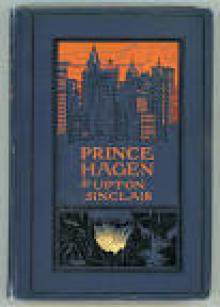 Prince Hagen
Prince Hagen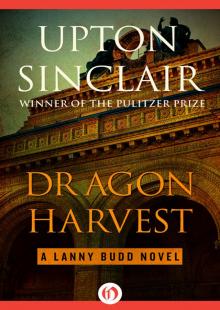 Dragon Harvest
Dragon Harvest The Jungle
The Jungle Sylvia's Marriage
Sylvia's Marriage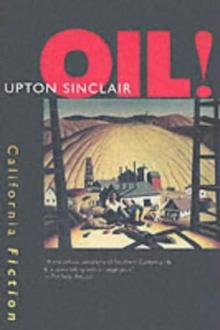 Oil! A Novel by Upton Sinclair
Oil! A Novel by Upton Sinclair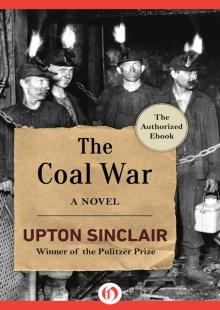 The Coal War: A Novel
The Coal War: A Novel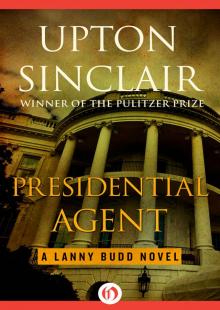 Presidential Agent
Presidential Agent World's End
World's End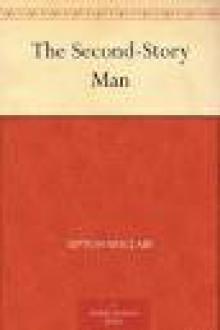 The Second-Story Man
The Second-Story Man O Shepherd, Speak!
O Shepherd, Speak!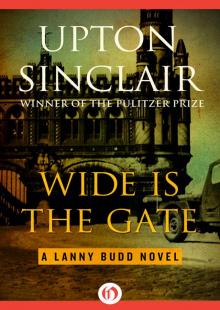 Wide Is the Gate
Wide Is the Gate The Return of Lanny Budd
The Return of Lanny Budd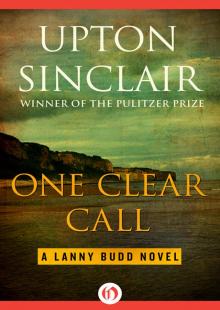 One Clear Call I
One Clear Call I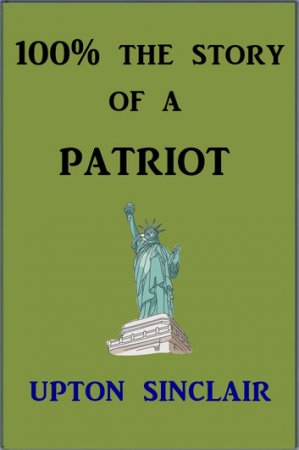 100%: the Story of a Patriot
100%: the Story of a Patriot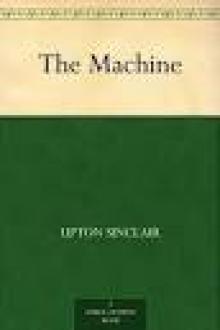 The Machine
The Machine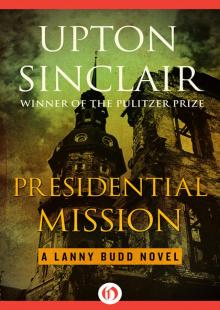 Presidential Mission
Presidential Mission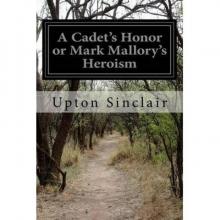 A Cadet's Honor: Mark Mallory's Heroism
A Cadet's Honor: Mark Mallory's Heroism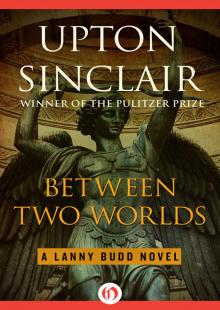 Between Two Worlds
Between Two Worlds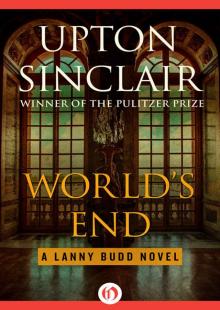 World's End (The Lanny Budd Novels)
World's End (The Lanny Budd Novels)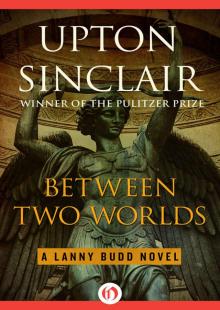 Between Two Worlds (The Lanny Budd Novels)
Between Two Worlds (The Lanny Budd Novels)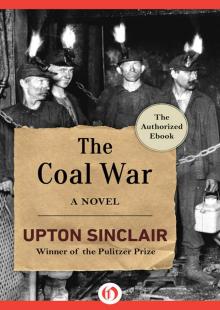 The Coal War
The Coal War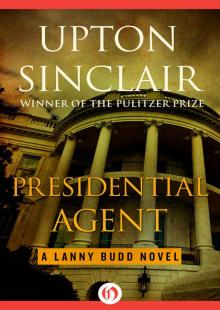 Presidential Agent (The Lanny Budd Novels)
Presidential Agent (The Lanny Budd Novels)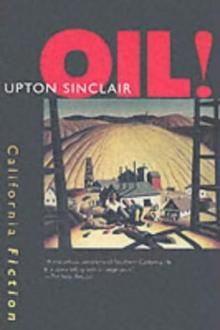 Oil (filmed as There Will Be Blood)
Oil (filmed as There Will Be Blood)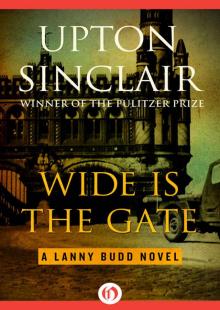 Wide Is the Gate (The Lanny Budd Novels)
Wide Is the Gate (The Lanny Budd Novels)